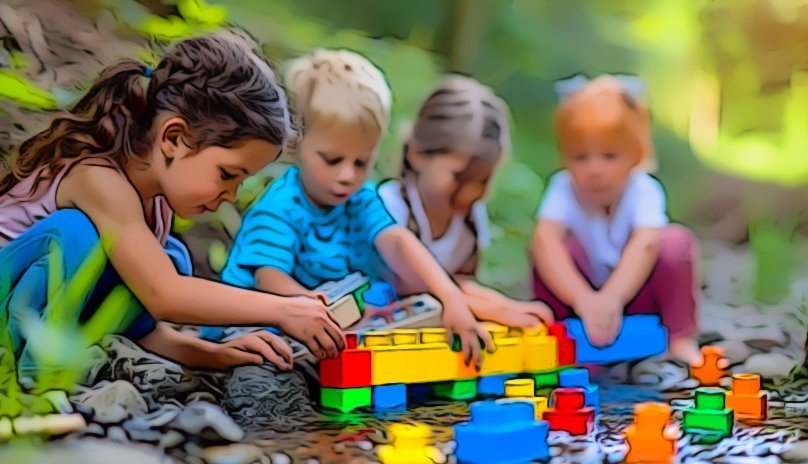
Being different is a strength: What makes ADHD children special
Share
Children affected by ADHD experience ten times more criticism and exclusion than neurotypical children. It's no wonder some of them become so resilient. Beyond that, however, appreciation also makes people strong. A list of 10 ADHD virtues.
Creativity: Children with ADHD often think unconventionally—in other words, divergent rather than convergent. They have the ability to generate a whole list of unique ideas in a short period of time. When they draw, make music, write, and invent things, wonderful little works of art can emerge. Not "normal" (or rather, not neurotypical)—but neurodivergent. You can encourage this trait by creating a quiet, tidy space for your child where they can explore their creative talents. You can also create pockets of time where this is possible without being interrupted by any appointments.

Empathy: Neurodivergent children are good at empathizing with others and often demonstrate a strong understanding of others' emotions (but often proceed differently: they typically compare other people's stories with a reflection of their own experiences). However, their sensitivity is often so pronounced that it can lead to overwhelm. Absorbing other people's emotions like a sponge can mean losing control. In these cases, emotional shutdown threatens: in the form of outbursts of anger (more likely to be hyperactive ADHD, the "fight" response) or complete isolation (more likely to be dreamer ADHD, the "freeze" response).
Strong sense of justice: You have a strong sense of fairness and often advocate for equal opportunities. You will hardly ever see a child with ADHD joining in the bullying of other children. What could happen, however, is that bullies show up with a bleeding nose or scraped knees because an ADHD child has courageously intervened in their own way. If you as a teacher are confronted with this, please involve both sides when it comes to conflict resolution. Physical aggression manifests itself in the form of injuries. Psychological violence such as bullying, on the other hand, is often recognized far too late. Moreover, the child with ADHD acted completely correctly: tit-for-tat is proven to be the best strategy for restoring order to a dysfunctional system (e.g., a bullying crew).

Willingness to help: ADHD children are often very willing to help others and offer support. They do this primarily out of warmth and interest in the matter—not out of calculation or to fit in with a group. This hope is sometimes abandoned quite early on, which is why ADHD children are more likely to be seen with a best friend than in a large clique. It's also better that the best friend isn't bullied (see above...).
High perceptual ability: They are very aware of their surroundings and attentive to things that others might miss. Their often visual-spatial learning style allows them to form an overall (also mental) picture of the world, but in doing so, they miss details, deadlines, and certain rules (which are often deliberately ignored, true to the motto "rules can be bent"). In a group setting, most ADHD children are more likely to be visionaries and idea generators than those who persevere to the end and meticulously implement them down to the last detail. Unless it's their own project that they love. Then you're in for a treat...

Curiosity and enthusiasm: They often display great curiosity and can be deeply enthusiastic about topics that engage them emotionally and intellectually. This makes them excellent inspirational and motivators for other children. The downside of this can be the "deadly boredom" these children may experience when purely tedious work (handwriting, correcting essays, "math blocks," etc.) is required. They will often vent their frustration so strongly that it affects those around them.
High sensitivity (hypersensitivity): Many ADHD children have heightened sensory and perceptual qualities and strong emotional expression. A bad family atmosphere at home? A toxic atmosphere in the classroom? Tensions among friends? Neurodivergent children will sense these things, even if they can't clearly identify them. Does your child always have the worst outbursts of anger in the nuclear family? Consider the entire family system, not just the symptoms of child anger. Often, these children act as a kind of "pressure valve" rather than creating the pressure themselves.

Authenticity and sincerity: You almost always appear very authentic and are honest in your communication, even if this sometimes leads to very direct feedback. The positive aspect is that you'll know right away where you stand with a child with ADHD. However, if grievances, such as injustice or passive aggression, are not resolved, this can also lead to "inner isolation." The "weirdo" withdraws, says little, and doesn't want to participate in group work, etc. Especially in school, such situations should be addressed early on to prevent complete social isolation.
Risk-taking and courage: You are often willing to take risks and display courage, especially in unusual or new situations. Never done something this way before? ("We've always done it this way"). For the ADHD child, this is the best and most wonderful reason to try something different. In elite sports, the rate of ADHD sufferers is above average. In prisons, however, it's also high (20% and more). Multi-billionaires Bill Gates and Richard Branson have been diagnosed with ADHD. Elon Musk: Asperger's syndrome - a form of autism. Fortunately, as parents, you can influence whether your child leans toward the "light" or "dark" side.

Ability to concentrate intensely (hyperfocus): Under the right conditions, children with ADHD can concentrate deeply and sustainably on tasks that pique their interest. However, you will hardly be able to stimulate this motivation extrinsically (from outside). Of course, you can suggest various hobbies to your child that they might find exciting. But ultimately, the "fire must burn from within." Here are some things you should keep in mind to help your child concentrate on "less exciting things" (i.e., most homework): Enough sleep, limited smartphone/tablet use, a healthy diet, plenty of outdoor exercise, regular relaxation, inspiring social interaction—and, of course, the most important ingredient: unconditional parental love, which provides both space and sets healthy boundaries (so-called authoritative parenting, as opposed to authoritarian parenting or a passive, overwhelmed "laissez faire" approach).
ADHD family support as an app? Is there also:
